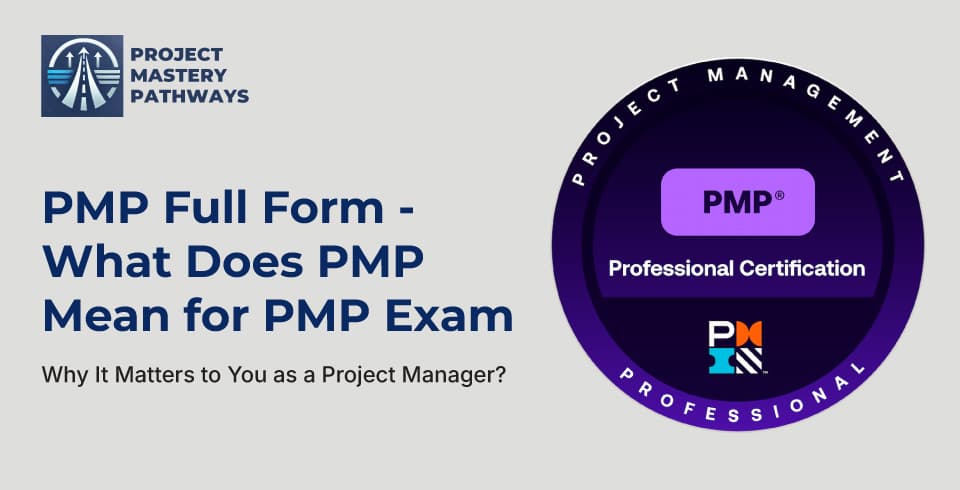Are you constantly hearing about “PMP” in project management circles but feeling uncertain about what it actually stands for and why everyone seems so excited about it? Do you find yourself wondering if this certification is just another acronym in the already complex world of project management, or if it’s something that could genuinely transform your career trajectory?
Understanding PMP – its full form, significance, and impact on your professional journey – is crucial for any aspiring or current project manager. By the end of this comprehensive guide, you’ll not only know exactly what PMP stands for but also understand why it’s considered the gold standard in project management certification and how it can elevate your career to new heights.
Understanding PMP: The Complete Full Form and Meaning
PMP stands for Project Management Professional – a globally recognized certification offered by the Project Management Institute (PMI), the world’s leading organization dedicated to project management excellence. Established as the premier credential for project managers worldwide, PMP certification validates your ability to manage people, processes, and business priorities effectively across any industry and methodology.
The Project Management Professional certification acknowledges that candidates have demonstrated proven project management skills and experience through rigorous evaluation. Unlike other certifications that focus on theoretical knowledge alone, PMP certification requires both extensive real-world experience and comprehensive understanding of project management principles, making it a credential that truly reflects professional competency.
What makes PMP unique is its universal applicability. The certification proves you have the project leadership and expertise in any way of working: predictive, hybrid, or agile methodologies. It demonstrates your ability to lead projects without being tied to any specific industry or geographic location, making it invaluable for professionals seeking career mobility and global recognition.
The acronym PMP has become synonymous with excellence in project management. When employers see PMP after your name, they immediately understand that you’ve met stringent requirements including thousands of hours of hands-on project leadership experience, formal project management education, and successful completion of a comprehensive examination. This recognition opens doors to opportunities that might otherwise remain closed to non-certified professionals.
For those exploring different certification options, understanding which certification is best for project management helps contextualize PMP’s position as the industry gold standard compared to other available credentials.
PMP Exam Requirements and Eligibility: What You Need to Know
The path to PMP certification involves meeting specific eligibility requirements that ensure only qualified professionals can pursue this prestigious credential. PMI has established these requirements to maintain the certification’s integrity and ensure that PMP holders possess both theoretical knowledge and practical experience.
Educational Requirements:
- Bachelor’s Degree Path: Minimum of 36 months of unique, non-overlapping professional project management experience within the last eight years
- High School Diploma/Associate’s Degree Path: Minimum of 60 months of unique, non-overlapping professional project management experience within the last eight years
- GAC Accredited Program Graduates: Minimum of 24 months of experience (reduced requirement for graduates from PMI’s Global Accreditation Center programs)
Project Management Education: All candidates must complete 35 hours of formal project management education or training. This requirement can be satisfied through various means:
- PMI Authorized Training Partner courses
- University courses in project management
- Corporate training programs that meet PMI standards
- Online project management courses from accredited providers
CAPM Waiver: If you hold an active Certified Associate in Project Management (CAPM) certification, the 35-hour education requirement is automatically waived, streamlining your path to PMP certification.
Experience Documentation: Your project management experience must be carefully documented, including specific details about your role, responsibilities, and the methodologies used. PMI focuses on your leadership and direction of cross-functional project teams, not just participation in projects.
The application process itself is thorough, requiring detailed documentation of your project experiences. PMI may randomly select applications for audit, requiring additional verification of your claimed experience and education. This rigorous process ensures that every PMP holder has genuinely earned their credential through substantial real-world project management experience.
Understanding PMP certification eligibility requirements provides detailed guidance on documenting your experience and preparing a successful application.
PMP Exam Cost and Investment Analysis for 2025
Understanding the financial investment required for PMP certification is essential for planning your professional development budget. As of August 2025, PMI has updated its fee structure, and the costs vary significantly based on your membership status with PMI.

Current PMP Exam Fees (Effective August 6, 2025):
- PMI Members: $425 USD
- Non-Members: $675 USD (increased from $595)
- Selected Other Countries (Non-Members): $655 USD (increased from $575)
PMI Membership Investment:
- Annual Membership Fee: $129 USD + $10 one-time application fee
- Student Membership: Discounted rate for full-time students
- Retiree Membership: Discounted rate for qualified retirees
- Annual Renewal: $119 USD for existing members
Cost-Benefit Analysis: Becoming a PMI member before taking the exam is financially advantageous. The total cost for first-time members taking the exam is $564 ($139 membership + $425 exam), compared to $675 for non-members – a savings of $111. Additionally, membership provides valuable benefits including free access to the PMBOK Guide, exclusive webinars, and networking opportunities.
Additional Costs to Consider:
- Training Courses: $500-$3,000 depending on provider and format
- Study Materials: $100-$300 for books, practice exams, and resources
- Retake Fees: $275 for members, $375 for non-members if you don’t pass initially
- Renewal Costs: 60 PDUs every three years to maintain certification
Return on Investment: The financial investment in PMP certification typically pays for itself quickly through career advancement. PMP certification holders report 33% higher median salaries than those without certification across 21 countries surveyed by PMI. Many professionals see salary increases of $10,000-$25,000 annually after obtaining their PMP certification.
For comprehensive cost analysis and budgeting guidance, explore PMP exam cost and retake cost to understand all financial aspects of your certification journey.
Why PMP Certification Matters: Career Impact and Professional Benefits
PMP certification represents far more than just another credential on your resume – it’s a career accelerator that opens doors to opportunities, higher compensation, and professional recognition worldwide. Understanding why PMP matters helps justify the investment and motivates your certification journey.
Global Recognition and Credibility: With over one million PMP certification holders worldwide, the credential is universally recognized by employers, clients, and industry professionals. The certification demonstrates your commitment to professional excellence and adherence to globally accepted project management standards. This recognition transcends geographic boundaries, making PMP valuable whether you work locally or internationally.
Salary and Compensation Benefits: Statistical data consistently shows significant financial benefits for PMP holders. According to PMI’s latest surveys, PMP certification holders earn 33% higher median salaries than their non-certified counterparts. This translates to substantial lifetime earning potential, often exceeding six figures annually for experienced professionals.
Career Advancement Opportunities: PMP certification positions you for senior project management roles, program management positions, and executive leadership opportunities. Many organizations require or strongly prefer PMP certification for senior project manager, program manager, and PMO director positions. The credential serves as a differentiator in competitive job markets.
Enhanced Skills and Knowledge: The PMP certification process itself enhances your project management capabilities. You’ll gain comprehensive understanding of the three critical domains: People (42% of exam focus), Process (50% of exam focus), and Business Environment (8% of exam focus). This knowledge directly applies to your daily work, making you a more effective project leader.
Professional Network Access: PMP certification connects you to a global community of project management professionals. PMI membership provides access to local chapter events, global gatherings, and networking opportunities that can advance your career through connections and knowledge sharing.
Industry Demand: The Bureau of Labor Statistics projects 7% growth in project management jobs through 2033 – faster than the national average. PMI’s Talent Gap report highlights a growing demand for millions of project professionals to step up and lead, making this an excellent time to pursue PMP certification.
For guidance on career development strategies, check out types of roles in project management within an organisation to understand how PMP certification opens various career paths.
Conclusion: Transform Your Project Management Career with PMP
Understanding what PMP stands for – Project Management Professional – is just the beginning of your journey toward project management excellence. This globally recognized certification represents the gold standard in project management credentialing, validating your expertise in leading projects across any industry, methodology, or geographic location.
The investment in PMP certification, while substantial, consistently delivers impressive returns through higher salaries, enhanced career opportunities, and professional recognition. With the 33% salary premium that PMP holders typically enjoy, the certification often pays for itself within the first year through increased compensation alone.
As the project management profession continues to grow and evolve, PMP certification ensures you remain competitive and relevant in an increasingly complex business environment. The credential demonstrates your commitment to professional excellence and positions you as a leader capable of driving organizational success through effective project delivery.
Whether you’re early in your project management career or a seasoned professional seeking to formalize your expertise, PMP certification provides the credibility, knowledge, and network connections necessary for long-term success. The rigorous requirements ensure that your achievement is meaningful and respected by employers worldwide.
Ready to begin your PMP certification journey? Follow my educational content on PMPwithRay for comprehensive guidance on PMP preparation, exam strategies, and career development insights. For structured training that meets PMI’s 35-hour education requirement, explore my specialized PMP certification courses on Udemy designed to help you succeed on your first attempt and accelerate your project management career.

